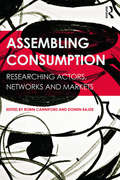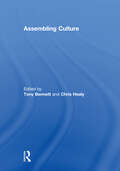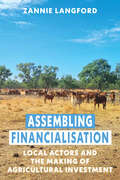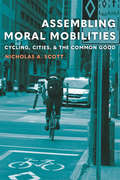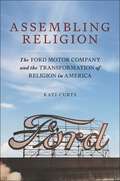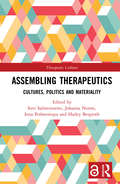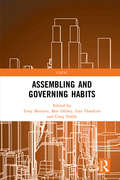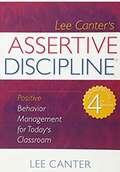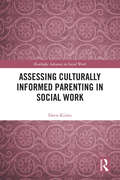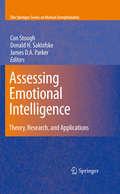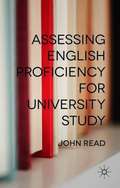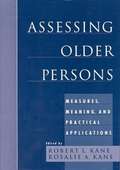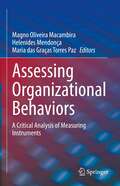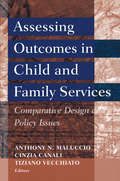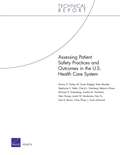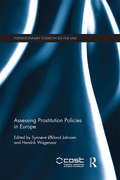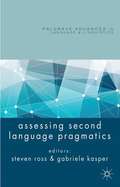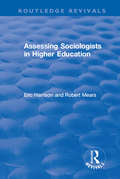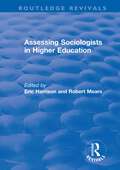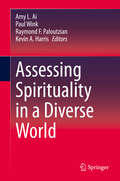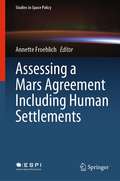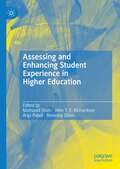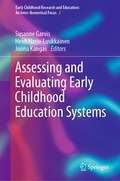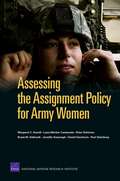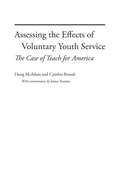- Table View
- List View
Assembling Consumption: Researching actors, networks and markets
by Domen Bajde Robin CannifordAssembling Consumption marks a definitive step in the institutionalisation of qualitative business research. By gathering leading scholars and educators who study markets, marketing and consumption through the lenses of philosophy, sociology and anthropology, this book clarifies and applies the investigative tools offered by assemblage theory, actor-network theory and non-representational theory. Clear theoretical explanation and methodological innovation, alongside empirical applications of these emerging frameworks will offer readers new and refreshing perspectives on consumer culture and market societies. This is an essential reading for both seasoned scholars and advanced students of markets, economies and social forms of consumption.
Assembling Culture
by Tony Bennett and Chris HealyIf the social does not exist as a special domain but, in Bruno Latour’s words, as ‘a peculiar movement of re-association and reassembling’, what implications does this have for how ‘the cultural’ might best be conceived? What new ways of thinking the relations between culture, the economy and the social might be developed by pursuing such lines of inquiry? And what are the implications for the relations between culture and politics? Contributors draw on a range of theoretical perspectives, including those associated with Deleuze and Guattari, Foucault, Law and Haraway, in order to focus on the roles of different forms of expertise and knowledge in producing cultural assemblages. What expertise is necessary to produce indigenous citizens? How does craniometry assemble the head? What kinds of knowledge were required to create markets for life insurance? These and other questions are pursued in this collection through a challenging array of papers concerned with cultural assemblages as diverse as brands and populations, bottled water and mobile television.
Assembling Financialisation: Local Actors and the Making of Agricultural Investment
by Zannie LangfordFarmers, Indigenous organisations, government and private-sector intermediaries from remote Northern Australia often negotiate with private finance capital to gain funds for agricultural development.The concept of financialisation is used to explore the drivers and effects of agrifood restructuring in the area, while assemblage theory is applied to position local actors as potential sites of power in negotiating connections between local spaces and global finance. This book demonstrates that while financialisation is a useful signifier of patterns of global change, it is assembled by a diverse range of often contradictory work.
Assembling Moral Mobilities: Cycling, Cities, and the Common Good
by Nicholas A. ScottIn the years since the new mobilities paradigm burst onto the social scientific scene, scholars from various disciplines have analyzed the social, cultural, and political underpinnings of transport, contesting its long-dominant understandings as defined by engineering and economics. Still, the vast majority of mobility studies, and even key works that mention the &“good life&” and its dependence on the car, fail to consider mobilities in connection with moral theories of the common good. In Assembling Moral Mobilities Nicholas A. Scott presents novel ways of understanding how cycling and driving animate urban space, place, and society and investigates how cycling can learn from the ways in which driving has become invested with moral value. By jointly analyzing how driving and cycling reassembled the &“good city&” between 1901 and 2017, with a focus on various cities in Canada, in Detroit, and in Oulu, Finland, Scott confronts the popular notion that cycling and driving are merely antagonistic systems and challenges social-scientific research that elides morality and the common good. Instead of pitting bikes against cars, Assembling Moral Mobilities looks at five moral values based on canonical political philosophies of the common good, and argues that both cycling and driving figure into larger, more important &“moral assemblages of mobility,&” finally concluding that the deeper meta-lesson that proponents of cycling ought to take from driving is to focus on ecological responsibility, equality, and home at the expense of neoliberal capitalism. Scott offers a fresh perspective of mobilities and the city through a multifaceted investigation of cycling informed by historical lessons of automobility.
Assembling Religion: The Ford Motor Company and the Transformation of Religion in America
by Kati CurtsHow Henry Ford institutionalized a social gospelHenry Ford did not just mass produce cars. As a member of the Episcopal Church, reader of New Thought texts, believer in the “gospel of reincarnation,” mass marketer of antisemitic material, and employer who institutionalized a social gospel, Henry Ford’s contributions to American models of business were informed by and produced for an America he understood to be broadly Christian. Though Ford’s efforts at the head of the Ford Motor Company have commonly been understood as secular, Ford himself was explicit that his work in engineering and auto production was prophetic and meant to remake the world.This religious history of Henry Ford and the Ford Motor Company repositions them within critical studies of religion, examining how Ford transformed American religious practice in the twentieth century. Drawing directly on documents from Ford’s archive, it examines Ford’s mass production methods and bureaucratic reforms as examples of prosperity gospel traditions, illuminating the ways manufacturing and technology intersect with American religious practice. Bridging American religious and industrial history, Assembling Religion offers a new and surprising way to understand Ford’s impact on culture, commerce, and the technology of labor.
Assembling Therapeutics: Cultures, Politics and Materiality (Therapeutic Cultures)
by Johanna Nurmi Suvi Salmenniemi Inna Perheentupa Harley BergrothThis volume examines the ways in which people engage with therapeutic practices, such as life coaching, mindfulness, complementary and alternative medicine, sex and relationship counselling, spiritual healing and self-tracking. It investigates how human and non-human actors, systems of thought and practice are assembled and interwoven in therapeutic engagements, and traces the situated, material and political dimensions of these engagements. By focusing on lived experiences through ethnographically informed case studies, the book elucidates the diverse forms, meanings and embodied effects of therapeutic engagements in different settings, as well as their potential for both oppressive and subversive social change. In this way, Assembling Therapeutics contributes to our understanding of multiple modes of healing, self-knowledge and power in contemporary societies.
Assembling and Governing Habits (CRESC)
by Tony BennettThe increasing significance of managing or changing habits is evident across a range of pressing contemporary issues: climate change, waste management, travel practices, and crowd control. Assembling and Governing Habits engages with the diverse ways in which habits are governed through the knowledge practices and technologies that have been brought to bear on them. The volume addresses three main concerns. The first focuses on how the habit discourses proposed by a range of disciplines have informed the ways in which different forms of expertise have shaped the ways in which habits have been managed or changed to bring about specific social objectives. The second concerns the ways in which habits are acted on as aspects of infrastructures which constitute the interfaces through which technical systems, human conducts and environments are acted on simultaneously. The third concerns the specific ways in which habit discourses and habit infrastructures are brought together in the regulation of ‘city habits’: that is, habits which have specific qualities arising out of the specific conditions – the rhythms and densities – of urban life and ones which, in the wake of the COVID-19 pandemic, have been profoundly disrupted. Written in a clear and direct style, the book will appeal to students and scholars with an interest in cultural studies, sociology, cultural geography, history of the sciences, and posthuman studies.
Assertive Discipline: Positive Behavior Management for Today's Classroom
by Lee CanterThis book contains the best concepts and teacher-tested strategies by the author plus new content. A special emphasis on the needs of new and struggling teachers includes practical actions for earning student respect and teaching them behavior management skills. <[p><P>The author also introduces a real-time coaching model and explains how to establish a school wide Assertive Discipline program.
Assessing Culturally Informed Parenting in Social Work (Routledge Advances in Social Work)
by Davis KiimaThis book explores how social workers incorporate issues of culture when evaluating the parenting competence of Black, Asian, and Minority Ethnic (BAME) parents and highlights the gap in how social workers assess safe parenting in BAME families. Drawing on a study that combined a phenomenological research philosophy with frame analysis, the book explores how culturally informed parenting is construed by social workers and BAME parents. It argues that effective assessment of the parenting competence of BAME parents is predicated on understanding how culture frames perspectives of what constitutes competent parenting. Throughout the eight chapters, the book moves the debate within the literature away from the universality of parenting concepts to a focus on a deeper understanding of culture. It highlights the influence that culture has on the way that BAME parents socialise their children, as well as how parents and social workers conceptualise safe parenting. The result is useful insights into the cultural context of parenting. The book will be of interest to all scholars and students of social work, childhood studies, sociology, and social policy, as well as social work professionals more broadly.
Assessing Emotional Intelligence: Theory, Research, and Applications (The Springer Series on Human Exceptionality)
by James D. Parker Donald H. Saklofske Con StoughManaging human emotions plays a critical role in everyday functioning. After years of lively debate on the significance and validity of its construct, emotional intelligence (EI) has generated a robust body of theories, research studies, and measures. Assessing Emotional Intelligence: Theory, Research, and Applications strengthens this theoretical and evidence base by addressing the most recent advances and emerging possibilities in EI assessment, research, and applications. This volume demonstrates the study and application of EI across disciplines, ranging from psychometrics and neurobiology to education and industry. Assessing Emotional Intelligence carefully critiques the key measurement issues in EI, and leading experts present EI as eminently practical and thoroughly contemporary as they offer the latest findings on: EI instruments, including the EQ-I, MSCEIT, TEIQue, Genos Emotional Intelligence Inventory, and the Assessing Emotions Scale. The role of EI across clinical disorders. Training professionals and staff to apply EI in the workplace. Relationships between EI and educational outcomes. Uses of EI in sports psychology. The cross-cultural relevance of EI. As the contributors to this volume in the Springer Series on Human Exceptionality make clear, these insights and methods hold rich potential for professionals in such fields as social and personality psychology, industrial and organizational psychology, psychiatry, business, and education.
Assessing English Proficiency for University Study
by John ReadThis book focuses on strategies and procedures for assessing the academic language ability of students entering an English-medium university, so that those with significant needs can have access to opportunities to enhance their language skills.
Assessing Older Persons: Measures, Meaning, and Practical Applications
by Robert L. Kane Rosalie A. KaneHow to assess function, health, emotion, cognition, and social well-being in older people.
Assessing Organizational Behaviors: A Critical Analysis of Measuring Instruments
by Helenides Mendonça Magno Oliveira Macambira Maria das Graças Torres PazThis book fills a gap in international literature by providing critical reviews on variables of organizational behavior and the main psychological instruments developed to measure them. Measuring instruments developed with theoretical and methodological rigor in the field of Organizational and Work Psychology can contribute to the development of diagnostic analyses to enable organizations to implement the evidence-based changes required for their survival. These changes demand diagnoses based on precise assessments of organizational and individual variables, but many times the professionals responsible for conducting these assessments are not sure of what is the best measuring instrument available. This book is intended to serve as a guide to these professionals. The volume is divided in two parts. The first part brings together chapters dedicated to the following micro-organizational variables: Job Crafting, reactions to organizational change, Psychological Wellbeing at Work, Bridge Employment Assessment in the Work-Retirement Transition, Resilience at Work, and Leadership in Organizations. The second part presents the state-of-the-art of research on the following macro-organizational constructs: Quality of Life at Work, Organizational Climate for Creativity, Values and Organizations, Assessments of Organizational Support, and Contributions by Social Networks Analysis and Organizational Effectiveness. The last chapter presents a critical discussion about the nature and future of organization behavior measuring. Assessing Organizational Behaviors: A Critical Analysis of Measuring Instruments is intended to help market professionals select the diagnostic instruments that best fit into their organizational reality in order to correctly assess organizational behavior. The book will also be of interest to researchers and students in the field of Organizational and Work Psychology as it provides comprehensive overviews of a wide range of instruments developed to measure different variables of organizational behavior.
Assessing Outcomes in Child and Family Services: Comparative Design and Policy Issues (Modern Applications Of Social Work Ser.)
by Anthony N. MaluccioIn this collective portrait, editors and authors do not attempt to draw systematic, country-by-country comparisons. Given the magnitude of the issues, they believed that it would be inappropriate to paint with too broad a stroke. What they have accomplished, however, is to codify and identify what the participants repeatedly noted in regard to issues and difficulties inherent in conducting outcome evaluation. These include: varying definitions of outcome; complexities in measuring outcomes of particular interventions with different groups of consumers and documenting the effectiveness of the intervention; the tendency to focus on evaluation of process more than outcome; the challenge of involving practitioners in the evaluation task, in part because its value is unclear to them or perceived as distant or untrustworthy; the typical inadequacy of resources available for systematic evaluation; and the need to inject rigor into the design and execution of evaluation projects. The authors demonstrate strong conviction about sharing research expertise across national boundaries; learning through each other how to cope with organizational impediments to cross-national collaboration; and strengthening the interaction between practice and research. Their contributions suggest that there is wide interest in pursuing cross-national collaboration. In recent years, largely in response to demands by their funding sources for accountability, assessment of performance, and cost effectiveness, researchers in human services have been devoting increased attention to outcome evaluation. Limited attention, however, has been given to the findings of evaluation studies conducted in different countries. The present volume has been organized and edited to address the task of learning from outcome research across the world. Its goal, an extension of a major goal of the human services in any one country, is to improve life chances of vulnerable children and youth.
Assessing Patient Safety Practices and Outcomes in the U.S. Health Care System
by Cheryl L. Damberg Donna O. Farley M. Susan Ridgely Peter Mendel Stephanie S. TelekiPresents the results of a two-year study that analyzes how patient safety practices are being adopted by U.S. health care providers, examines hospital experiences with a patient safety culture survey, and assesses patient safety outcomes trends. In case studies of four U.S. communities, researchers collected information on the dynamics of local patient safety activities and on adoption of safe practices by hospitals.
Assessing Prostitution Policies in Europe (Interdisciplinary Studies in Sex for Sale)
by Hendrik Wagenaar Synnøve Økland JahnsenOnce again, prostitution occupies a prominent position on public and political agendas, both nationally and internationally. A topic of concern and interest within social and academic realms, it is a highly moralised, contested issue that is at the centre of heated and drawn-out debates. With each chapter dedicated to a separate country and written by a national authority on the subject, Assessing European Prostitution Policies seeks to explore how prostitution is regulated in 21 European countries, thus drawing out important implications for an effective and humane prostitution policy. Indeed, this innovative volume brings together systematic accounts of how national and local forms of governance influence the commercial market for sex as well as the lives of sex workers and third parties. All chapters cover the history of prostitution policy, national laws regulating prostitution, policy formulation and implementation, the national discourse on prostitution, the gap between national and local regulation, the impact of policy on the lives and rights of sex workers, and sex worker advocacy organizations. In addition to this, the authors examine and highlight how immigration, labour, fiscal and welfare law have as much impact on the sex trade as designated prostitution law. A unique interdisciplinary title that is comprehensive in its coverage, Assessing European Prostitution Policies will appeal to undergraduate and postgraduate students, postdoctoral researchers, sex worker advocacy organisations and policy makers interested in fields such as Sexuality and Prostitution, Public Policy, Criminology and Gender Studies.
Assessing Second Language Pragmatics
by Steven J. Ross Gabriele KasperThis volume is the first book-length collection of studies on the assessment of pragmatic competencies in a second or foreign language. Grounded in theoretical perspectives on communicative and interactional competencies, the first section of the book examines the reception and production of speech acts through a variety of assessment methods and a range of quantitative and qualitative analyses. The second section investigates interviewer and candidate interaction in different forms of oralproficiency interview.
Assessing Sociologists in Higher Education
by Eric Harrison Robert MearsThis title was first published in 2001. A detailed investigation of the practice of teaching sociology in a climate of increasing scrutiny from external stakeholders. The book explores an academic community accustomed to deconstructing the practices of other professional groups, but now facing a challenge to some of its own beliefs and assumptions.
Assessing Sociologists in Higher Education (Routledge Revivals)
by Eric Harrison Robert MearsThis title was first published in 2001. A detailed investigation of the practice of teaching sociology in a climate of increasing scrutiny from external stakeholders. The book explores an academic community accustomed to deconstructing the practices of other professional groups, but now facing a challenge to some of its own beliefs and assumptions.
Assessing Spirituality in a Diverse World (Religion, Spirituality And Health: A Social Scientific Approach Ser. #6)
by Raymond F. Paloutzian Amy L. Ai Paul Wink Kevin A. HarrisThis volume addresses an important problem in social scientific research on global religions and spirituality: How to evaluate the role of diverse religious and spiritual (R/S) beliefs and practices within the rapid evolution of spiritual globalization and diversification trends. The book examines this question by bringing together a panel of international scholars including psychologists, sociologists, and researchers in religious studies, public health, medicine, and social work. The content includes chapters describing innovative concepts of post-Christian spirituality, Eastern forms of meditation, afterlife beliefs associated with the three dominant cultural legacies, various non-religious worldviews, spiritual Jihad, and secular and religious reverence. The book also covers such important themes as spiritual well-being, faith, struggle, meaning making, modeling, and support, as well as mysticism and using prayer to cope with existential crises. This book advances the understanding of the role of R/S across different faiths and cultural systems, including both Western and non-Western ones, and enriches the mainstream of psychological sciences and practices. It appeals to students, educators, researchers, and clinicians in multiple related fields and disciplines.
Assessing a Mars Agreement Including Human Settlements (Studies in Space Policy #30)
by Annette FroehlichThis book is dedicated to the nascent discussion of the legal aspects of human exploration and possible settlement of Mars, and provides fresh insights and new ideas in two key areas. The first one revolves around the broader aspects of current space law, such as intellectual property rights in outer space, the legal implications of contact with extra-terrestrial intelligence, legal considerations around the freedom of exploration and use, and the International Space Station agreement as a precedent for Mars. The second one focuses on the creation and management of a new society on Mars, and includes topics such as human reproduction and childbirth, the protection of human rights in privately-funded settlements, legal aspects of a Martian power grid, and criminal justice on the red planet. With multiple national space agencies and commercial enterprises focusing on Mars, it is more than likely that a human presence will be established on the red planet in the coming decades. While the foundation of international space law, laid primarily by the Outer Space Treaty, remains the framework within which humans will engage with Mars, new and unforeseen challenges have arisen, driven particularly by the rapid pace of technological advancement in recent years. To ensure that space law can keep up with these developments, a new scholarly work such as the present one is critical. By bringing together a number of fresh international perspectives on the topic, the book is of interest to all scholars and professionals working in the space field.
Assessing and Enhancing Student Experience in Higher Education
by John T. E. Richardson Anja Pabel Mahsood Shah Beverley OliverThe book makes an important contribution to the discourse on student experience in higher education. The book includes chapters that cover important aspects of the 21st century student experience. Chapters cover issues such as: new trends and insights on the student experience; the changing profile of students in higher education and performance measures used to assess the quality of student experience, institutional approaches in engaging students, using student voice to improve the quality of teaching, COVID-19 and its impact on international students, innovative partnerships between students and academic staff, student feedback and raising academic standards, the increased use of qualitative data in gaining insights into student experience, the use of innovative learning spaces and technology to enhance the learning experience, and the potentially disrupting nature of student feedback and its impact on the health and wellbeing of academic staff, and the increased use of social media reviews by students.
Assessing and Evaluating Early Childhood Education Systems (Early Childhood Research and Education: An Inter-theoretical Focus #2)
by Susanne Garvis Heidi Harju-Luukkainen Jonna KangasThis book provides global perspectives on assessment and evaluation practices with young children in contemporary times within early childhood education systems. It critiques and evaluates current evaluation and assessment goals and tools in early childhood settings. The book also compares the different approaches to educational evaluations from different countries in early childhood education and care. It provides insights into different approaches, techniques as well as perspectives of micro and macro-levels of analysis. This book aims to create an international understanding about the thematic conceptions of assessment for early childhood education and care.
Assessing the Assignment Policy for Army Women
by Margaret C. Harrell Jennifer Erin Kavanagh Bryan W. Hallmark Peter Schirmer Laura WerberSince current policies for assigning military women were issued, the U.S. Army has changed how it organizes and fights. Assessing the Assignment Policy for Army Women considers whether the Army is adhering to the assignment policies as well as the appropriateness of the current U.S. Department of Defense and Army assignment policies, given how units are operating in Iraq.
Assessing the Effects of Voluntary Youth Service
by James YounissThis book uses survey data from all accepted applicants to Teach for America 1993-98 to assess the longer-term effect of youth service on participants' current civic attitudes and behaviors. While TFA "graduates" score higher than the two comparison groups – "dropouts" and "non-matriculants" – on a broad range of attitudinal items measuring civic commitment, these differences appear to be less a byproduct of the TFA experience than a reflection of current involvement with the TFA organization. Moreover, the attitudinal differences are not reflected in actual civic behavior. Specifically, graduates lag behind non-matriculants in current service activity and generally trail both non-matriculants and drop-outs in self-reported participation in five other forms of civic/political activity measured in the study. Graduates also vote at lower rates than the other two groups. Finally, fewer graduates report employment in "pro-social" jobs than either non-matriculants or drop-outs. The authors close by speculating on what mechanisms may help explain variation in the long-term effects of youth service or activist experiences.
